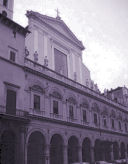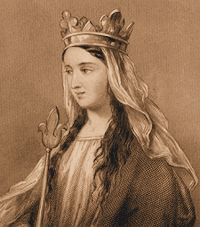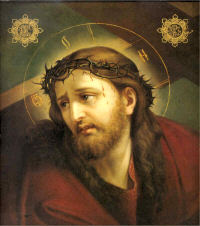Lent: March 14th
Friday of the First Week of Lent; Ember Friday
Other Commemorations: St. Matilda (RM)
» Enjoy our Liturgical Seasons series of e-books!
The Roman Martyrology commemorates St. Matilda (895-968) (also known as "Maud" or "Maude"), Queen of Germany and wife of King Henry I. She was well known throughout the realm for her generosity, she taught the ignorant, comforted the sick, and visited prisoners. She was betrayed by Otto after Henry’s death when he falsely accused her of financial mismanagement.
Today is Ember Friday of the Lent or Spring Embertide: There are two principal objects for the Ember Days of this period of the year: the first is to publicly offer thanks to God the season of Spring, and secondly to ask God to bless the fruits of the earth and human labor. A third traditional focus of the Ember Days is to ask Him to enrich with His choicest graces the priests and sacred ministers particularly those who might be ordained on this day. See Contemporary Observation of Ember Days and Lenten Ember Days for more information.
Meditation on the Liturgy—Ember Friday in Spring
The need to make reparation is a vital, inescapable urge of a free person. His very nature cries out for order and peace. His reason tells him that where an order has been violated, the order must be repaired; and the higher the order, the greater must be the reparation. To be free at all, is to accept the responsibility for atonement. Is is a violation of God's order. Sin demands reparation—the reparation of personal penance, personal prayer, personal charity to all. Part of our atonement to God is made by serving our fellow men.
—Maryknoll Missal
Meditation for Friday of the First Week of Lent—Lent, a Great Spiritual Retreat
As he places the Ashes on the person's forehead the celebrant says "Remember you are dust, and to dust you shall return" (cf. Gn 3: 19), or he repeats Jesus' exhortation, "Repent, and believe in the Gospel" (cf. Mk 1: 15). Both formulas are a reminder of the truth about human life: we are limited creatures, sinners always in need of repentance and conversion. How important it is to listen to and accept this reminder in our time! When contemporary man proclaims his total autonomy from God, he enslaves himself and often finds himself in comfortless loneliness. The invitation to conversion, therefore, is an incentive to return to the embrace of God, the tender and merciful Father, to entrust oneself to him, to entrust oneself to him as adoptive sons, regenerated by his love. With wise pedagogy the Church repeats that conversion is first and foremost a grace, a gift that opens the heart to God's infinite goodness. He himself anticipates with his grace our desire for conversion and accompanies our efforts for full adherence to his saving will. Therefore, to convert is to let oneself be won over by Jesus (cf. Phil 3: 12) and "to return" with him to the Father. . . . ( more)
—Pope Benedict XVI
Things to Do:
- Today's reading from the book of Isaiah declares that the fasting desired by the Lord is not so much denying oneself food (although this is important) but rather, consists in "Sharing your bread with the hungry, sheltering the oppressed and the homeless; / Clothing the naked when you see them, and not turning your back on your own." Many families take these words to heart by having an inexpensive, penitential dinner on Fridays in Lent (such as beans and rice) and then giving the extra money to the poor.
- Many families give each child one pretzel during Friday dinners in Lent. Remind your children of the spiritual significance of the pretzel.
- Pray the Stations of the Cross today with your family. An excellent version with beautiful meditations composed by our Holy Father is his Stations of the Cross at the Colosseum. Some other recommended versions are: Eucharistic Stations of the Cross, and the more traditional Stations of the Cross written by Saint Alphonsus Liguori can be found in most Catholic bookstores. Here are some guidelines for praying the Stations of the Cross in your home.
- Any of the linked activities (Fun Pretzel Project, Lenten Scrapbook, Candelabrum for Stations of the Cross) are a wonderful way for your children to spend their Friday afternoons throughout this season of Lent.

Friday of the First Week of Lent (Ember Friday)
Station with Santi Dodici Apostoli (The Twelve Holy Apostles, also Santi Apostoli):
Today's station is at the minor basilica of the Twelve Apostles. Traditionally, this is the place where the Romans choose their candidates for priesthood (Rite of Election). It was erected by Julius I (337-352) over the barracks of ancient Rome's firemen and entrusted since 1463 to the Conventual Franciscans. Originally dedicated to the Apostles St. James and St. Philip, it was rededicated to all the Apostles in the 16th century.
For more on Santi Dodici Apostoli, see:
- Churches of Rome
- The Station Churches of Rome
- Rome Art Lover
- Roman Churches
- Churches of Rome
- PNAC
- Aleteia
- Station Church
- The Catholic Traveler
For further information on the Station Churches, see The Stational Church.
St. Matilda (also known as "Maud" or "Maude")
 This princess was daughter of Theodoric, a powerful Saxon count. Her parents placed her very young in the monastery of Erford, of which her grandmother Maud was then abbess. Our Saint remained in that house, an accomplished model of all virtues, till her parents married her to Henry, son of Otho, Duke of Saxony, in 913, who was afterwards chosen king of Germany. He was a pious and victorious prince, and very tender of his subjects.
This princess was daughter of Theodoric, a powerful Saxon count. Her parents placed her very young in the monastery of Erford, of which her grandmother Maud was then abbess. Our Saint remained in that house, an accomplished model of all virtues, till her parents married her to Henry, son of Otho, Duke of Saxony, in 913, who was afterwards chosen king of Germany. He was a pious and victorious prince, and very tender of his subjects.
Whilst by his arms he checked the insolence of the Hungarians and Danes, and enlarged his dominions by adding to them Bavaria, Maud gained domestic victories over her spiritual enemies more worthy of a Christian and far greater in the eyes of Heaven. She nourished the precious seeds of devotion and humility in her heart by assiduous prayer and meditation. It was her delight to visit, comfort, and exhort the sick and the afflicted; to serve and instruct the poor, and to afford her charitable succor to prisoners. Her husband, edified by her example, concurred with her in every pious undertaking which she projected.
After twenty-three years' marriage God was pleased to call the king to himself, in 936. Maud, during his sickness, went to the church to pour forth her soul in prayer for him at the foot of the altar. As soon as she understood, by the tears and cries of the people, that he had expired, she called for a priest that was fasting to offer the holy sacrifice for his soul.
She had three sons: Otho, afterwards emperor; Henry, Duke of Bavaria; and St. Brunn, Archbishop of Cologne. Otho was crowned king of Germany in 937, and emperor at Rome in 962, after his victories over the Bohemians and Lombards.
The two oldest sons conspired to strip Maud of her dowry, on the unjust pretence that she had squandered the revenues of the state on the poor. The unnatural princes at length repented of their injustice, and restored to her all that had been taken from her.
She then became more liberal in her alms than ever, and founded many churches, with five monasteries.
In her last sickness she made her confession to her grandson William, the Archbishop of Mentz, who yet died twelve days before her, on his road home. She again made a public confession before the priests and monks of the place, received a second time the last sacraments, and, lying on a sack-cloth, with ashes on her head, died on the 14th of March in 968.
—Excerpted from Lives of the Saints, by Alban Butler, Benziger Bros. ed. [1894]
Patronage: death of children; disappointing children; falsely accused people; large families; people ridiculed for their piety; queens; second marriages; widows
Symbols and Representation: alms; bag of money; crown; orb; scepter; purse, indicative of her generosity; queen with a whip; queen holding a church
Highlights and Things to Do:
- Read more about St. Matilda:
- Read Spotlight on Queen Mathilda of Saxony.
- St. Mathilda's remains are in Quedlinburg Abbey next to her husband. The church is now used by the Lutheran Evangelical Church in Germany






